Must I use message queue? Let's talk about why we should use it
This article brings you relevant knowledge about message queues. It mainly introduces the reasons why we use message queues and why we should use message queues. For those who are interested, let’s take a look. I hope everyone has to help.
Why use message queue, six words summary: decoupling, asynchronous, peak elimination
1)Decoupling
System in traditional mode The coupling between them is too strong. How to put it, for example: System A sends data to three systems B, C, and D through interface calls. If system E is connected in the future or system B does not need to be connected, system A will still need to modify the code, which is very troublesome. .

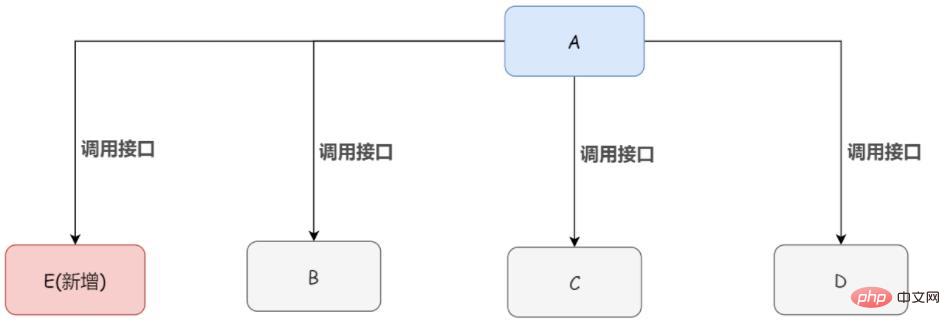
If system A generates a relatively critical piece of data, then it must always consider if the four systems B, C, D, and E are down. What to do? Have they all received this data? Clearly, System A is heavily coupled with other systems.
And if we write data (message) into the message queue, the system that needs the message directly consumes it from the message queue itself. In this way, System A does not need to consider who to send data to, nor does it need to maintain this code, nor does it need to consider whether other systems are successfully called, failure timeout, etc. Anyway, I am only responsible for production, and I don't care about anything else.

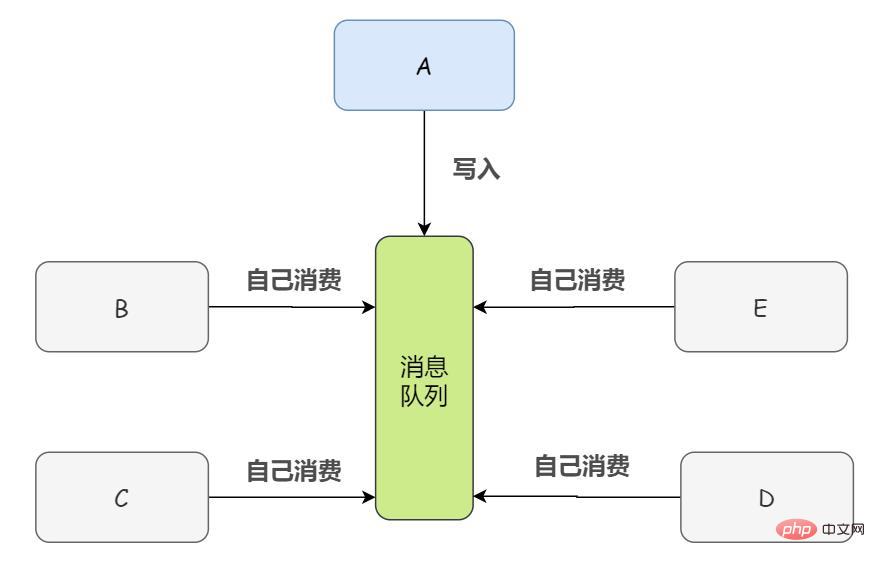
2) Asynchronous
Let’s first look at the traditional synchronization situation. For example: System A receives a user The request requires a library writing operation, and the same library writing operation needs to be performed in the three systems B, C, and D. If A writes the library locally, it only takes 1ms, while the three systems B, C, and D take 100ms, 200ms, and 300ms respectively. The final total request delay is 1 100 200 300 = 601ms, which greatly reduces the user experience.

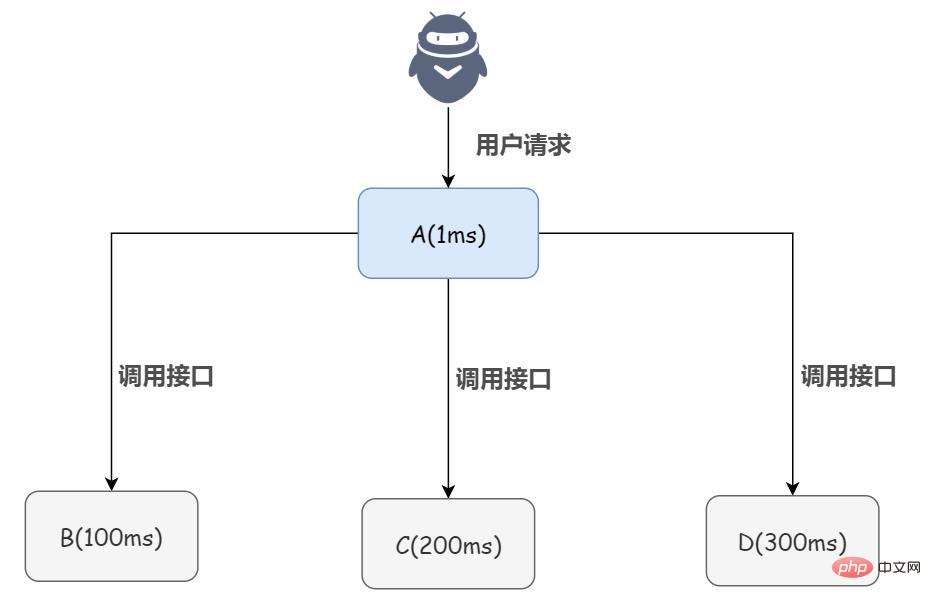
If you use the message queue, then system A only needs to send 3 messages to the message queue. If it takes 5ms, system A will receive one from The total time from request to return response to the user is 1 5 = 6ms. For the user, the experience satisfaction is directly maximized.

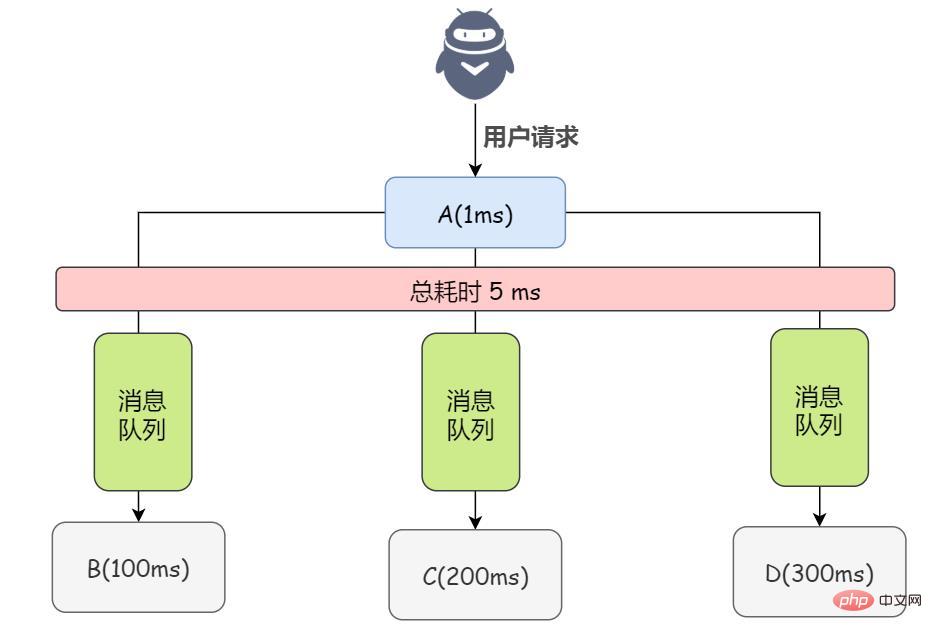
#3) Peak elimination
If no cache or message queue is used, then the system is directly based on the database MySQL , if there is such a peak period and a large number of requests flood into MySQL, there is no doubt that the system will crash directly.
If we use the message queue, assume that MySQL can process up to 1k pieces of data per second, and 5k pieces of data flood in during the peak period. However, these 5k pieces of data flow into the message queue. In this way, our system can slowly pull requests from the message queue according to the capabilities of the database, and do not exceed the maximum number of requests it can handle per second.
That is to say, 5k requests come in and 1k requests go out of the message queue every second. Assuming the peak period is 1 hour, then there may be hundreds of thousands or even millions of requests backlogged in the message queue during this period. in queue. However, this short peak backlog is completely acceptable, because after the peak period, there will not be so many requests entering the message queue per second, but the database will still process it at a rate of 1k requests per second. Therefore, as soon as the peak period is over, the system will quickly process the backlog of messages.
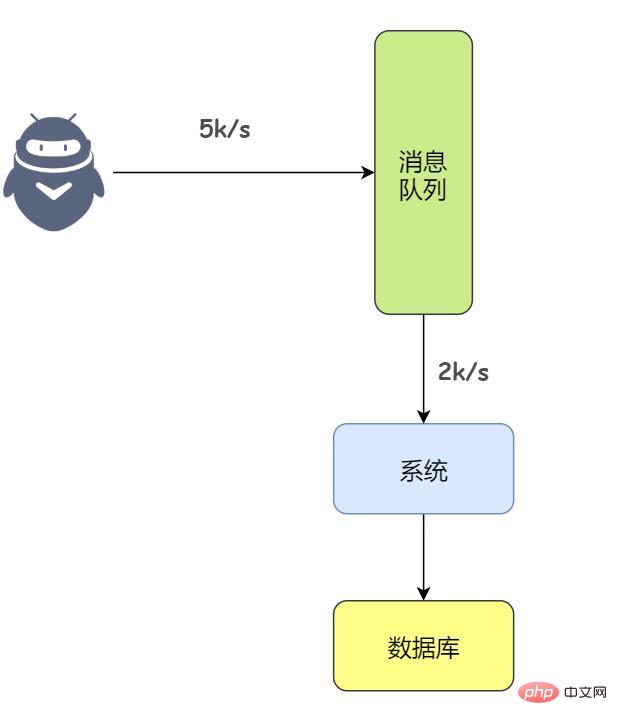
Recommended study: "Redis Video Tutorial"
The above is the detailed content of Must I use message queue? Let's talk about why we should use it. For more information, please follow other related articles on the PHP Chinese website!

Hot AI Tools

Undresser.AI Undress
AI-powered app for creating realistic nude photos

AI Clothes Remover
Online AI tool for removing clothes from photos.

Undress AI Tool
Undress images for free

Clothoff.io
AI clothes remover

Video Face Swap
Swap faces in any video effortlessly with our completely free AI face swap tool!

Hot Article

Hot Tools

Notepad++7.3.1
Easy-to-use and free code editor

SublimeText3 Chinese version
Chinese version, very easy to use

Zend Studio 13.0.1
Powerful PHP integrated development environment

Dreamweaver CS6
Visual web development tools

SublimeText3 Mac version
God-level code editing software (SublimeText3)

Hot Topics
 1386
1386
 52
52
 Java Websocket development practice: how to implement message queue function
Dec 02, 2023 pm 01:57 PM
Java Websocket development practice: how to implement message queue function
Dec 02, 2023 pm 01:57 PM
Java Websocket development practice: How to implement the message queue function Introduction: With the rapid development of the Internet, real-time communication is becoming more and more important. In many web applications, real-time updates and notification capabilities are required through real-time messaging. JavaWebsocket is a technology that enables real-time communication in web applications. This article will introduce how to use JavaWebsocket to implement the message queue function and provide specific code examples. Basic concepts of message queue
 How to use message queue for asynchronous task processing in FastAPI
Jul 30, 2023 pm 09:21 PM
How to use message queue for asynchronous task processing in FastAPI
Jul 30, 2023 pm 09:21 PM
How to use message queues for asynchronous task processing in FastAPI Introduction: In web applications, it is often necessary to process time-consuming tasks, such as sending emails, generating reports, etc. If these tasks are placed in a synchronous request-response process, users will have to wait for a long time, reducing user experience and server response speed. In order to solve this problem, we can use message queue for asynchronous task processing. This article will introduce how to use message queues to process asynchronous tasks in the FastAPI framework.
 Golang development: Build a reliable message queue using NATS
Sep 21, 2023 am 11:21 AM
Golang development: Build a reliable message queue using NATS
Sep 21, 2023 am 11:21 AM
Golang development: Using NATS to build a reliable message queue, specific code examples are required Introduction: In modern distributed systems, the message queue is an important component used to handle asynchronous communication, decouple system components and achieve reliable message delivery. This article will introduce how to use the Golang programming language and NATS (the full name is "High Performance Reliable Message System") to build an efficient and reliable message queue, and provide specific code examples. What is NATS? NATS is a lightweight, open source messaging system.
 The wonderful use of Redis in message queue
Nov 07, 2023 pm 04:26 PM
The wonderful use of Redis in message queue
Nov 07, 2023 pm 04:26 PM
The wonderful use of Redis in message queues Message queues are a common decoupled architecture used to deliver asynchronous messages between applications. By sending a message to a queue, the sender can continue performing other tasks without waiting for a response from the receiver. And the receiver can get the message from the queue and process it at the appropriate time. Redis is a commonly used open source in-memory database with high performance and persistent storage capabilities. In message queues, Redis's multiple data structures and excellent performance make it an ideal choice
 How to deal with distributed transactions and message queues in C# development
Oct 09, 2023 am 11:36 AM
How to deal with distributed transactions and message queues in C# development
Oct 09, 2023 am 11:36 AM
How to handle distributed transactions and message queues in C# development Introduction: In today's distributed systems, transactions and message queues are very important components. Distributed transactions and message queues play a crucial role in handling data consistency and system decoupling. This article will introduce how to handle distributed transactions and message queues in C# development, and give specific code examples. 1. Distributed transactions Distributed transactions refer to transactions that span multiple databases or services. In distributed systems, how to ensure data consistency has become a major challenge. Here are two types of
 How to implement message queue using Linux script operations in Java
Oct 05, 2023 am 08:09 AM
How to implement message queue using Linux script operations in Java
Oct 05, 2023 am 08:09 AM
How to use Linux script operations to implement message queues in Java requires specific code examples. Message queues are a common communication mechanism used to transfer data between different processes. In Java, we can implement message queues using Linux script operations so that we can easily send messages to or receive messages from the queue. In this article, we will detail how to implement message queues using Java and Linux scripts, and provide specific code examples. To get started with Java and Lin
 How to implement a simple message queue using Redis and Golang
Aug 01, 2023 am 08:09 AM
How to implement a simple message queue using Redis and Golang
Aug 01, 2023 am 08:09 AM
How to use Redis and Golang to implement a simple message queue Introduction Message queues are widely used in various application scenarios, such as decoupling system components, peak shaving and valley filling, asynchronous communication, etc. This article will introduce how to use Redis and Golang to implement a simple message queue, helping readers understand the basic principles and implementation methods of message queues. Introduction to Redis Redis is an open source in-memory database written in C language, which provides key-value pair storage and processing functions for other commonly used data structures. Redis is known for its high performance,
 In-depth understanding of the underlying implementation mechanism of Kafka message queue
Feb 01, 2024 am 08:15 AM
In-depth understanding of the underlying implementation mechanism of Kafka message queue
Feb 01, 2024 am 08:15 AM
Overview of the underlying implementation principles of Kafka message queue Kafka is a distributed, scalable message queue system that can handle large amounts of data and has high throughput and low latency. Kafka was originally developed by LinkedIn and is now a top-level project of the Apache Software Foundation. Architecture Kafka is a distributed system consisting of multiple servers. Each server is called a node, and each node is an independent process. Nodes are connected through a network to form a cluster. K




